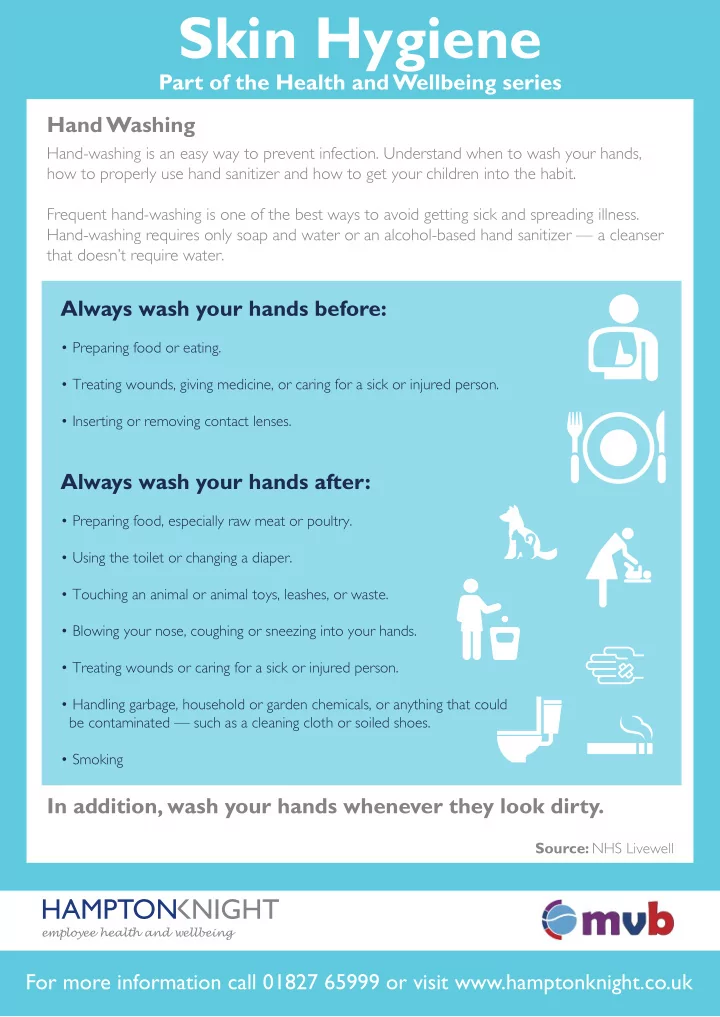

Skin Hygiene Part of the Health and Wellbeing series Hand Washing Hand-washing is an easy way to prevent infection. Understand when to wash your hands, how to properly use hand sanitizer and how to get your children into the habit. Frequent hand-washing is one of the best ways to avoid getting sick and spreading illness. Hand-washing requires only soap and water or an alcohol-based hand sanitizer — a cleanser that doesn’t require water. Always wash your hands before: Health and Wellness • Preparing food or eating. • Treating wounds, giving medicine, or caring for a sick or injured person. Healthy Eating and Exercise Series • Inserting or removing contact lenses. Always wash your hands after: • Preparing food, especially raw meat or poultry. • Using the toilet or changing a diaper. • Touching an animal or animal toys, leashes, or waste. • Blowing your nose, coughing or sneezing into your hands. • Treating wounds or caring for a sick or injured person. • Handling garbage, household or garden chemicals, or anything that could be contaminated — such as a cleaning cloth or soiled shoes. • Smoking In addition, wash your hands whenever they look dirty. Source: NHS Livewell For more information call 01827 65999 or visit www.hamptonknight.co.uk
Dermatitis Part of the Health and Wellbeing series Skin Checks for Dermatitis Regularly check your skin for signs of Dermatitis Look for: Dryness Itching Redness ...which can develop into flaking , scaling , cracks , swelling and blisters . If you think you may have Dermatitis, you should report it to your employer. Your employer may then refer you to Occupational Health. For further information please visit the Occupational Health Department Source: HSE For more information call 01827 65999 or visit www.hamptonknight.co.uk
Skin Part of the Health and Wellbeing series Skin Contact Distance your skin from chemicals and wet work Save Your Skin Save Working Distance Chemicals and Wet work • Avoid skin contact • Do not immerse hands • Use a tool • Use suitable gloves Source: HSE For more information call 01827 65999 or visit www.hamptonknight.co.uk
Risk Factors Part of the Health and Wellbeing series There are some roles within the manufacturing environment that will expose you to hazards that could cause Dermatitis. Dermatitis is a skin condition caused by contact with something that irritates the skin or causes an allergic reaction. It usually occurs where the irritant touches the skin. Irritant contact dermatitis Dermatitis can occur quickly after contact with a strong irritant, or over a longer period from • Wet work repeated contact with weaker irritants. • Soaps, shampoos and detergents • Solvents Irritants can be chemical, biological, mechanical • Some food (eg onions) or physical. • Oils and greases • Metal working fluid • Dusts • Acids and alkalis Preventing Dermatitis Hand Cream Use barrier creams Wash your hands Never submerse your Use the right gloves and moisturisers to regularly but make bare hands directly for the task rehydrate the skin sure you dry them into oils or metal properly working fluids No task is undertaken unless it can be done safely. No one will be criticised for stopping what he or she are doing or for stopping any activity if it is believed to be unsafe or environmentally harmful – in fact we will thank you for caring! Source: HSE For more information call 01827 65999 or visit www.hamptonknight.co.uk
Hydraytion Part of the Health and Wellbeing series Source: National Hydration Council For more information call 01827 65999 or visit www.hamptonknight.co.uk
Recommend
More recommend